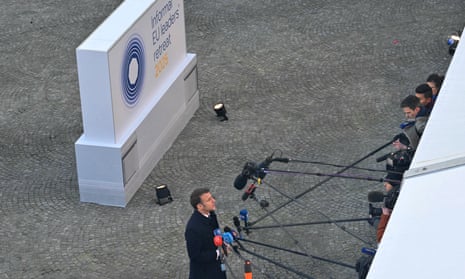EU ready to react to ‘unnecessary and stupid’ tariffs threatened by Trump, leaders say – Europe live

First EU reactions to Trump’s tariff threats against the bloc – summary

Jakub Krupa
EU leaders have signalled that the bloc would be prepared to retaliate against the US if Donald Trump followed through on his threats to impose tariffs on European goods.
Speaking ahead of their informal meeting in Brussels, they repeatedly called for calm and stressed the value of EU-US cooperation, but indicated that they would not hide away from responding with tariffs if targeted first.
EU foreign policy chief Kaja Kallas said the bloc was “listening carefully” to Trump’s comments and “preparing on our side” to respond if needed.
However, she stressed that “there are no winners in trade wars” and pointed out that China would be the only beneficiary of that scenario.
French president Emmanuel Macron said that if Europe is “attacked in terms of trade … [it] will have to stand up for itself and therefore react.”
Polish prime minister Donald Tusk said the EU should do all it can to avoid “totally unnecessary and stupid tariff wars,” adding it would be a “cruel paradox” if the bloc was forced into a trade war with a long-standing ally.
Danish prime minister Mette Frederiksen, who is already embroiled in a separate crisis with Trump over the future of Greenland, said that while she would typically “never support fighting allies, if the US puts tough tariffs on Europe, we need a collective and robust response.”
Luxembourg’s prime minister Luc Frieden also said that “the answer to tariffs is to reply with [the] same action,” but insisted it should not overshadow today’s discussions on defence.
But some leaders struck a more conciliatory tone.
German chancellor Olaf Scholz said any tariffs would be “bad for the US and bad for Europe,” and stressed the need for cooperation to resolve this situation.
Finnish prime minister Petteri Orpo said: “We have to negotiate with Trump,” before adding: “I am not going to start a war, I want to start negotiations.”

Key events
-
People flee Santorini as earthquake fears grow
-
Greek prime minister appeals for calm over ‘very intense’ tremors in Santorini
-
What else is coming today?
-
Next steps in French budgetary talks
-
New Nato defence spending pledge will have to be ‘considerably higher than 2%’, Nato’s Rutte says
-
Lessons from Serbia, Hungary, Italy, Slovakia, Poland and Belarus for Americans under Trump
-
‘I wouldn’t do anything prematurely,’ Irish prime minister strikes cautious note in response to Trump’s tariff threats
-
CDU/CSU’s Merz to set out his plans after weekend mass protests over migration proposals
-
Spain’s former football chief on trial over World Cup kiss
-
First EU reactions to Trump’s tariff threats against the bloc – summary
-
Time to get closer with Britain, Poland’s Tusk says
-
If targeted, Europe will have to make itself respected, France’s Macron warns
-
Tariffs ‘bad for US and Europe,’ Germany’s Scholz warns, but hopes for cooperative way forward
-
We need to avoid ‘unnecessary and stupid’ tariffs, trade wars, Polish PM Tusk says
-
Danish PM calls for ‘collective and robust response’ if Trumps targets EU with tariffs
-
Greenland ‘not for sale,’ Danish prime minister says
-
‘We have to negotiate with Trump,’ Finnish prime minister says
-
US tariffs only benefit China, EU foreign policy chief Kallas says
-
Answer to tariffs is ‘to reply with same actions,’ Luxembourg’s Frieden says
-
Protests in Serbia
-
Latest on Ukraine
-
Denmark ‘not being a good ally’ over Greenland, US vice-president Vance says
-
New government in Belgium
-
EU cannot be ‘naive’ about Trump’s tariffs, Spanish economy minister says
-
Latest business reaction
-
Morning opening: Any Other Business
People flee Santorini as earthquake fears grow

Helena Smith
in Athens
Earthquake fears have prompted people to flee Santorini, as Greece’s most popular island destination continues to be hit by what scientists described as a “barrage” of tremors.
With authorities on heightened alert amid mounting concerns of an impending natural disaster, residents, tourists and workers are scrambling to leave the island on ferries and planes.
By midday on Monday, Aegean airlines, the national carrier, had announced it was doubling the number of flights from Athens to Santorini for the next two days, as travel agents said the new flights were sold out “within seconds”.
On Monday, an earthquake measuring 4.8 on the Richter scale, the most powerful yet, was registered at 2.17 PM local time. Land and rockslides were also recorded.
Earlier today, the country’s prime minister Kyriakos Mitsotakis appealed for calm, saying that authorities were monitoring a “very intense” geological phenomenon over recent days, and adding: “I want to ask our islanders above all to remain calm” (13:59).
Aaaand in Brussels, here’s Nato secretary general Mark Rutte and UK prime minister Keir Starmer ahead of their meeting on European defence and security.
I will bring you the key news lines from their press conference later.
Meanwhile in France, there are reports that the Socialist party decided against supporting a potential no-confidence vote in François Bayrou’s government, which is expected to be triggered by the hard left La France Insoumise (France Unbowed) in response to his use of special constitutional powers to pass the 2025 budget (see 13:36).
The vote could happen on Wednesday.
But without the Socialists, Bayrou’s critics will probably struggle to get the majority required to oust the prime minister. We’ve gone through the numbers on Friday (17:00).
Bayrou will speak in the Assemblée nationale soon.
We’re still waiting for Merz as the CDU/CSU event is running slightly behind schedule, with the CSU’s Markus Söder delivering his lines first.
In a passionate stump speech, he says chancellor Olaf Scholz is not fit for the job, as he insists Germany needs “a change of direction” so it does not follow a number of European countries down the populist right route.
He also seeks to clearly distance CDU/CSU from the far-right Alternative für Deutschland, ruling out any form of cooperation with them after the election.
Greek prime minister appeals for calm over ‘very intense’ tremors in Santorini
Greek prime minister Kyriakos Mitsotakis appealed for calm on Monday after a wave of seismic tremors hit the tourist island of Santorini, prompting concern among locals and hundreds of departures, AFP reports.
Speaking from Brussels, Mitsotakis said authorities were monitoring a “very intense” geological phenomenon over recent days, adding: “I want to ask our islanders above all to remain calm.”
Known for its spectacular cliffside views and a dormant volcano, Santorini and neighbouring Aegean Sea islands have been hit by hundreds of tremors since last week, the largest with a magnitude of 4.9.
The neighbouring islands of Anafi, Ios and Amorgos have also been affected.
The activity has prompted authorities to send rescue units to the area and close schools, and some areas have been declared off-limits because of rockslide risks.
What else is coming today?

Jakub Krupa
In terms of timings of what else is coming, we’re expecting (all times CET):
-
CDU/CSU’s chancellor candidate Friedrich Merz to speak in Berlin around 15:15.
-
French prime minister François Bayrou to speak in Paris as he introduces his budget around 16:00.
-
UK prime minister Keir Starmer and Nato secretary general Mark Rutte to speak with the media after their meeting in Brussels around 16:40.
Then for all the night owls among you:
(We will catch up on that presser in tomorrow morning’s Europe Live.)
Next steps in French budgetary talks

Kim Willsher
in Paris
France faces further political uncertainty as the prime minister, François Bayrou, prepares to ignore threats of a no-confidence motion and force the 2025 budget bill through without a vote.
With no majority in the Assemblée Nationale, the centrist politician has little choice but to use the constitutional measure, known as the “49.3”, on Monday to pass the legislation aimed at reducing the country’s soaring deficit.
The hard-left France Unbowed (LFI) has said it will lodge a confidence vote immediately afterwards, a move supported by the country’s ecology party (EELV) and Communist party (PCF).
The Parti Socialiste (PS) has not said if it will support the motion and the far-right National Rally party (RN) is meeting in the next few hours to decide whether to throw its weight behind the move, which would bring down a second government in less than two months.
Bayrou, who was appointed shortly afterwards, will present his budget bill to the lower house on Monday afternoon after the text was approved by a cross party committee last week.
If Bayrou uses the 49.3 to push through the bill, as he suggested this weekend he will, opponents have 24 hours to lodge a censure motion that must be voted on within 48 hours.
If it succeeds, the bills are rejected, the government collapses and France returns to a political impasse.
If the budget bill is passed, it will come into effect in the second half of the month.
New Nato defence spending pledge will have to be ‘considerably higher than 2%’, Nato’s Rutte says
Nato secretary general Mark Rutte has now joined the EU leaders at their informal meeting in Brussels.
Before going into Palais d’Egmont, or Egmontpaleis if you prefer the Dutch name, he said that Europe needs to “ramp up defence spending”, and the new defence spending pledge will have to be “considerably higher than 2%”.
He was also asked about Nato’s position on Greenland, and he diplomatically said that he had good discussions with Denmark and other allies, and all parties “have to do more collectively” to protect the high north.
Asked to comment on Trump’s tariff threats, he declined to get involved saying jokingly that it’s above his pay grade.
Lessons from Serbia, Hungary, Italy, Slovakia, Poland and Belarus for Americans under Trump

Julian Borger
in Belgrade
Citizens of central and eastern Europe are long accustomed to receiving counsel from a multitude of well-meaning US organisations on how to protect their fragile democracies following the fall of the Berlin Wall. Now, after just 10 days of Donald Trump’s executive orders and civil service purges, the advice is beginning to flow the other way.
With the new Trump era likely to pose unprecedented challenges the message from Europe’s fragile democracies is: stay united and safeguard your institutions.
‘I wouldn’t do anything prematurely,’ Irish prime minister strikes cautious note in response to Trump’s tariff threats
Earlier today, Lisa O’Carroll brought us comments from Ireland’s deputy prime minister Simon Harris on Trump’s tariff threats (11:34).
But this morning we also heard from the new prime minister, Micheál Martin, who is at the EU leaders’ talks in Brussels.
This is what he said:
The European Union has to act as one. We are an economic entity. We have a single market.
Trade is, as you know, the competency of the commission, but obviously member states have an input into how Europe will respond, how Europe navigates this period.
So first of all, we have to see what happens, and assess it and measure it, calibrate the impacts, and then develop our response.
But I wouldn’t do anything prematurely right now, until we see what exactly is being proposed, if something is being proposed.
Writing for the Guardian, Jörg Lau, an international correspondent for the German weekly Die Zeit, said that Merz “has shattered the taboo that had underpinned German politics since the war”, making “the unthinkable … more possible”.
Merz has emboldened the AfD and damaged his own credibility. Moreover, he shattered a taboo central to postwar German political culture by breaking the norm of non-cooperation with the extreme right in any capacity. It is hard to overstate this moment’s significance.
It is a poor excuse that none of it was Merz’s intention. By failing to shun the votes of a party suspected of being an extremist organisation by German intelligence agencies to get his immigration proposals adopted, Merz reneged on a vow of non-cooperation.
In November, he had publicly declared the CDU would never vote with the AfD, nor even accept “coincidental majorities” with them.
CDU/CSU’s Merz to set out his plans after weekend mass protests over migration proposals
Earlier today, I reported on German chancellor Olaf Scholz’s unusual detour into domestic politics and criticism of the CDU/CSU opposition party as he arrived at the EU leaders’ meeting in Brussels.
His reaction comes after a difficult week in German politics, which culminated in a turbulent sitting of the Bundestag on Friday discussing the opposition’s ultimately failed proposals to tighten the country’s immigration laws. We covered this in Europe Live on Friday (here).
But over the weekend, thousands of Germans protested against his plans and his perceived openness to accept the votes of the far-right Alternative für Deutschland for their proposals, breaking the longstanding “firewall” arrangement in German politics.
CDU/CSU’s chancellor candidate Friedrich Merz, who leads in the polls with three weeks to go, will try to regain the momentum today as he speaks at the party’s conference and sets out his plans should he be elected into the office, including on economy and migration.
CDU delegates are expected to support a 15-point plan to implement “immediately” if the party wins the elections and forms a government.
It contains many of the measures in one motion passed with the AfD, including plans to turn back asylum seekers at the German border and the unlimited detention of “dangerous” migrants who are set for deportation.
He will speak in the afternoon; in the meantime, here are some pictures from this weekend’s protests.



